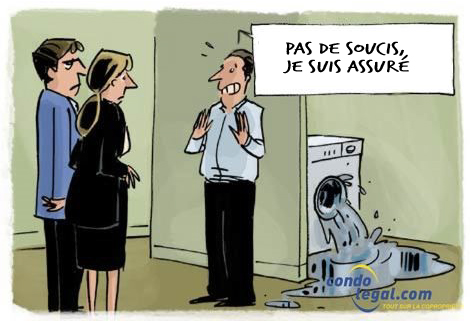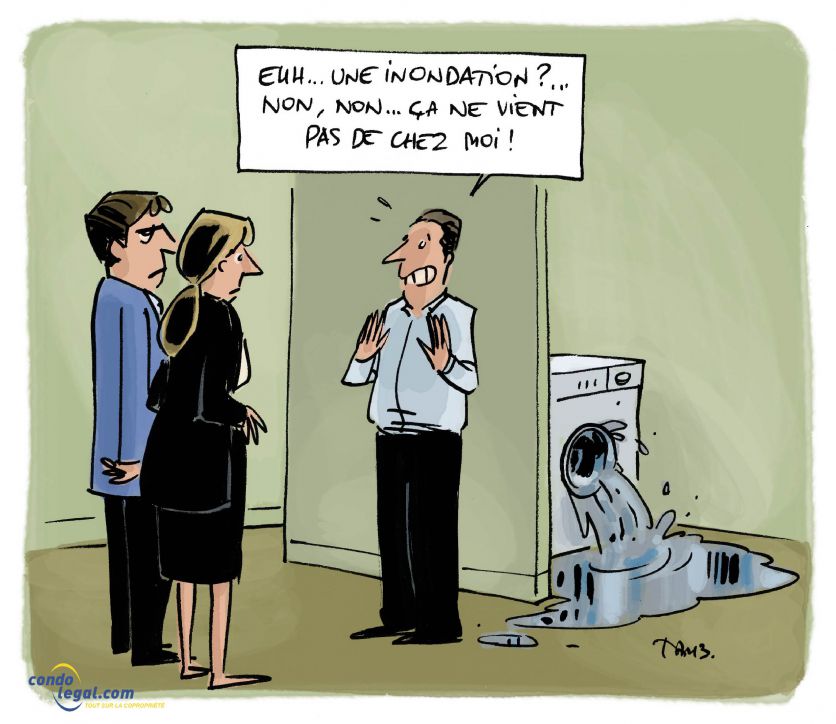
A bathtub or a washing machine that overflows into the apartment below, a water heater that conks out and spills down six floors: losses involving the civil liability of a co-owner are many co-ownerships. And they are expensive! This is why the amount of insurance premiums and deductibles have increased significantly in recent years.
Worse still, some insurers no longer want to insure co-ownerships, because of a loss ratio that has become out of control. This situation is directly related to the insurer of the syndicate, which is almost always called upon to cover a loss, when damage has been caused to the common and private portions. Thus the question of who is responsible arises. It is also necessary to know the applicable law to the owner at fault. Other considerations affect both the insurer of the syndicate and those of the co-owners concerned, to determine who will pay what?
Presumption of fault established by article 1465 of the Civil Code of Québec
In principle, the co-owner is responsible for a loss arising from his private portion. Article 1465 of the Civil Code of Québec stipulates that:
"The custodian of a thing is bound to make reparation for injury resulting from the autonomous act of the thing, unless he proves that he is not at fault”.
Case law had the opportunity to apply this article to some co-owners, such as in the occurrence of the overflow of a washing machine, the breakage of a bath faucet or of a shower base. But since then, a line of jurisprudence has excluded (in divided co-ownership) the application of this regime of civil liability.
Contractual liability regime
The relationship between the syndicate and the co-owners is, first and foremost, a contractual relationship. In this sense, the declaration of co-ownership is deemed a contract of adhesion. On this point, article 1062 of the Civil Code of Québec provides that: "The declaration of co-ownership binds the co-owners, their successors and the persons who signed it, and produces its effects towards them from the time of its registration. "
Declaration of co-ownership
The declarations of co-ownership generally contain a clause holding any co-owner liable (in respect of other co-owners and of the syndicate) for damages caused by his fault or negligence, and by the act of a thing for which he is legally responsible. Courts have recognized that co-owners thus assume contractually the liability for damages caused by the act of things under their custody regardless of a fault or a negligence on their part.
Acting with prudence and and diligence
In addition, the inappropriate behavior of a co-owner with respect to the maintenance of the private portions and the common portions for restricted use may, in certain circumstances, engage his civil liability. In this respect, article 1458 of the Civil Code of Québec provides as follows:
« Every person has a duty to honour his contractual undertakings.
Where he fails in this duty, he is liable for any bodily, moral or material injury he causes to the other contracting party and is bound to make reparation for the injury; neither he nor the other party may in such a case avoid the rules governing contractual liability by opting for rules that would be more favourable to them." »
Such behavior must be qualified as faulty if it is not a reasonably prudent and diligent behavior, in the light of all relevent circumstances. For example, in January 2019, the civil liability of a co-owner was retained by the Court of Québec - Small Claims Division for allowing a large amount of snow (about 5 feet in some places) to accumulate on her balcony. In that decision, the declaration of co-ownership provided for an obligation for all co-owners to ensure the clearing of their balcony, even if it was a common portion for restricted use.
Another co-owner was found responsible for the breakage of the toilet tank located in its private portion. The court concluded that the co-owner had to assume the pecuniary consequences of the damages caused to the syndicate, that is to say the amount of the deductible of the insurance policy, and this, because of the provisions of the declaration of co-ownership. The Court decided in that case that a co-owner could be held responsible, even if he had not committed a fault.
Legislative modification
The second paragraph of section 1074.1 of the Civil Code of Québec, which came into force on December 13, 2018, provides that:
« A syndicate that does not avail itself of insurance may not sue the following persons for the damages for which it would otherwise have been indemnified by the insurance:
(1) a co-owner;
(2) a person who is a member of a co-owner’s household; or
(3) a person in respect of whom the syndicate is required to enter into an insurance contract to cover the person’s liability. "
Does this mean that, from now on, the syndicate can no longer sue the co-owner responsible for a loss? No, because in principle, he would be entitled to claim the amount of the deductible. He would also be entitled to sue the co-owner for damages in excess of the amount of insurance.
Therefore, "damages for which the syndicate would have been compensated by its insurance" must not be confused with damages for which the syndicate could not be compensated. For example, a co-owner may have caused damage over the years due to a lack of maintenance of the shower seals. Since this is a gradual damage commonly excluded, the insurer would be justified in refusing to compensate the syndicate, in which case the syndicate would retain its claim against the co-owner.
But then, under what conditions does the syndicate retain its appeal against the co-owner?
Syndicate's recourses against the offending co-owner
An initial version of section 1074.2 of the Civil Code of Quebec, which came into force on December 13, 2018, stated the following:
« The sums incurred by the syndicate to pay the deductibles and make reparation for the injury caused to property in which the syndicate has an insurable interest may not be recovered from the co-owners otherwise than by their contribution for common expenses, subject to damages it can obtain from the co-owner bound to make reparation for the injury caused by the co-owner’s fault. Any stipulation which is inconsistent with the provisions of the first paragraph is deemed unwritten.»
For example, if the deductible is $ 5,000, and the work is $ 8,000, the syndicate can recover $ 5,000 from the co-owner at fault. But the syndicate's right to be compensated, for the amount it had to pay because of the deductible, must henceforth be justified by evidence showing the fault of the co-owner responsible for the loss, for example the lack of maintenance of its private part.
It was therefore no longer sufficient to show that the damage had emanated from the co-owner's unit in order for the co-owner to be required to repay the syndicate's deductible. It was for the syndicate to show that the co-owner had been at fault, that is, that he had not behaved as a reasonably prudent and diligent co-owner.
This heavy burden on the syndicate made it difficult to prove a co-owner's fault. Moreover, the syndicate could no longer rely on the provisions of the declaration of co-ownership providing for the co-owner's faultless liability for damage caused by a property he has in his custody.
In order to overcome the difficulties created by the first draft of section 1074.2 of the Civil Code of Quebec, the section was amended by Bill 41. Since March 17, 2020, it now reads:
« The sums incurred by the syndicate to pay the deductibles and make reparation for the injury caused to property in which the syndicate has an insurable interest may not be recovered from the co-owners otherwise than by their contribution for common expenses, subject to damages it can obtain from the co-owner bound to make reparation for the injury caused by the co-owner’s fault and, in the cases provided for in this Code, for the injury caused by the act, omission or fault of another person or by the act of things in the co-owner’s custody.
Any stipulation which is inconsistent with the provisions of the first paragraph is deemed unwritten.»
The effect of this addition is to make applicable, to the relations between the syndicate and the co-owners, various presumptions provided elsewhere in the Civil Code of Quebec, including the presumption of fault under section 1465 of the Civil Code of Quebec.
In practical terms, this means that the syndicate will no longer have to show that the co-owner has committed a fault, which will be presumed. Rather, it will be up to the co-owner to show that he did not commit any wrongdoing.
Syndicate’s recourses action against the insurer of the co-owner at fault
Remember that in co-ownership, several insurance coexist: each occupant of an apartment, whether an owner or a lessee, is usually insured against civil liability. Even if the insurer of the offending co-owner has no contractual relationship with the co-ownership, he could be sued by the syndicate acting as the insurer of the co-owner, under article 2501 of the Civil Code of Quebec, which reads as follows: "An injured third person may bring an action directly against the insured or against the insurer or against both.”
Defense of the co-owner at fault
A co-owner could invoke that the syndicate has taken out insurance in which the deductible is unreasonable and that he should not have to suffer such prejudice. Remember that the co-owners are deemed to be the beneficiaries of the insurance taken out by the syndicate, since they pay the premiums thereof from their common expenses.
 WHAT YOU SHOULD KNOW ! For a loss that occurred after December 12, 2018, a syndicate of co-owners can no longer rely on the presumption of fault stipulated in the declaration of co-ownership or in article 1465 of the Civil Code of Québec, to establish the liability of a co-owner.
WHAT YOU SHOULD KNOW ! For a loss that occurred after December 12, 2018, a syndicate of co-owners can no longer rely on the presumption of fault stipulated in the declaration of co-ownership or in article 1465 of the Civil Code of Québec, to establish the liability of a co-owner.
 WHAT TO KEEP IN MIND : It is in the syndicates of co-owners’ best interest to compel the co-owners to install in their private portion a water leak protection system and to implement mandatory inspections of all taps and hot water tanks. .
WHAT TO KEEP IN MIND : It is in the syndicates of co-owners’ best interest to compel the co-owners to install in their private portion a water leak protection system and to implement mandatory inspections of all taps and hot water tanks. .
 WARNING ! The syndicate's recourse against a co-owner at fault must, as a general rule, be preceded by a formal notice. Failing doing so, or a late mailing to the addressee, may result in the syndicate losing its recourse.
WARNING ! The syndicate's recourse against a co-owner at fault must, as a general rule, be preceded by a formal notice. Failing doing so, or a late mailing to the addressee, may result in the syndicate losing its recourse.








